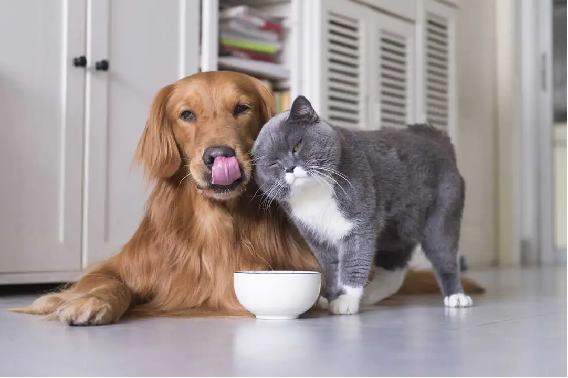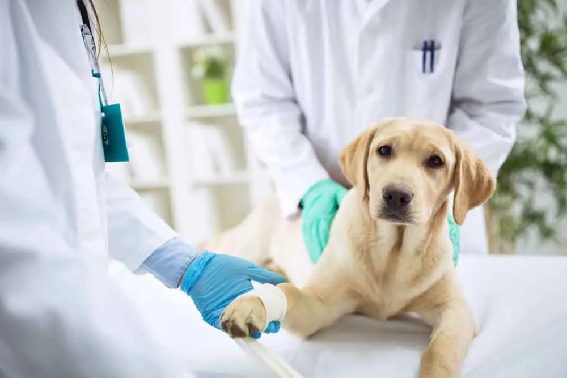Why does your pet recover slowly from illness?
-ONE-
When treating pet diseases in my daily life, I often hear pet owners say melancholically, “Other people’s pets will recover in a few days, but why hasn’t my pet recovered in so many days?”? From the eyes and words, it can be seen that pet owners are filled with anxiety, which is the biggest enemy of pet disease recovery.
Some people often say that doctors are very cold, as if they don’t care about the feelings and thoughts of pets, nor do they care whether they are in pain or unhappy. I don’t think doctors need to invest more emotions, what they need is to be attentive and patient. I often face a choice when treating pets, whether it is a long pain or a short pain. If it makes pets happy but the disease cannot be cured, I would rather let them suffer for a few days and then recover their health. However, most pet owners are unable to control their emotions and would rather choose to make their pets more comfortable than sacrifice their health.
We can give many examples of pet owners spoiling their pets and affecting their health recovery. For example, during the treatment of pet pancreatitis and gastritis, pets may need to stop eating for 3-4 days under normal circumstances. They are not allowed to eat at all, and any food intake can compromise the effectiveness of early treatment, and may even require recalculating the stop time.
Feeding sick pets is another challenge in terms of treatment. If pets don’t eat, pet owners will collapse and then try to find messy food, begging pets to open their noble mouths and give their owners some face. Even if these foods have already been warned by doctors that eating them can worsen the disease, then with a lucky heart, eating a small amount is okay? Then compromise with the pet and eat more and more. In the hospital, when facing pets, we only consider whether it is due to illness that leads to loss of appetite and unwillingness to eat. Food that is good for illness is just these. If you don’t eat it, then go hungry.
-TWO-
In addition to weak self-management willpower, losing rationality due to the impact of pet diseases is also a problem that many pet owners will inevitably face. The so-called emergency medical treatment refers to this,
When pets get sick, many pet owners don’t care about what disease it is? Also don’t care about the reason for getting sick? Due to concerns about death or worsening of illness, one often chooses aggressive treatment methods. We all know that all diseases must be mild and severe. Even if we catch a cold and sneeze, it can cause death. But who of us gets a cold and worries about dying soon after sneezing or coughing a few times? But if this thing were to happen to pets, it would be completely chaotic, including nebulization, oxygen therapy, intravenous drip, CT, surgery, how to spend more money, how to do it, how to listen and act on it, without considering what the pet’s symptoms are.
We often encounter pets sneezing a few times, coughing a few times, having good appetite and mental health, and then being hospitalized for nebulization, administering steroids, and administering a large amount of anti-inflammatory drugs. They spend thousands of yuan thinking they have treated a lot of illnesses, and then look at the billing list as a bunch of nutritional supplements. According to the World Health Organization’s promotion of scientific medication methods, “medication can be used without medication, oral administration can be administered without injection, and injection can be administered without drip.” Originally, small illnesses may be cured by rest and rest, and it is necessary to use some drugs with significant side effects. Coupled with prolonged tension, the original symptoms of the disease may not be severe, but the body may actually be worse.
-THREE-
I cannot demand that every pet owner maintain absolute rational analysis when encountering pet diseases, but it is always possible to calm down. First, find a piece of paper and list the symptoms of the dog on it, from the head to the tail. Is there a cough? Do you sneeze? Is there a runny nose? Do you vomit? Do you have a fever? Is it diarrhea? Is walking unstable? Is it limping? Is there a decrease in appetite? Are you mentally lethargic? Is there any pain in any part of the body? Is there any bleeding in any area?
When these are listed, the general problem lies in which part as a pet owner should also know. When doing any laboratory tests in the hospital, you should save the original manuscript. When you see the question above, what does this value represent? What tests and values are used to diagnose the diseases mentioned by the doctor? When the symptoms and laboratory results, as well as the diseases and treatment plans mentioned by the doctor, do not match the four items, you need to ask where exactly is wrong.
Don’t be anxious or irritable when encountering diseases, comprehensively grasp the symptoms of the disease, conduct necessary disease examinations, accurately diagnose the disease, use rational and scientific medication, and strictly follow treatment plans. Only in this way can sick pets recover their health as quickly as possible.
Post time: May-06-2024





